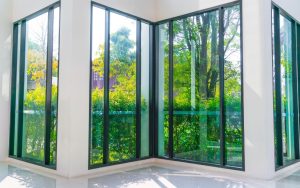*The glass industry in Mexico has a professional business platform, designed for the exchange of information, the presentation of products, services and technological innovation, including training sessions and lectures on current trends within the sector. Glasstech Mexico / Doors & Windows, will be held from July 9 to 11, 2024 at Expo Guadalajara. Please register as a trade visitor here: https://shorturl.at/J21b3
Aluminum in construction; advantages, applications and considerations.
(via Ulbrinox)
Aluminum is a widely used material in the construction industry thanks to its unique properties. This lightweight and strong metal is found in everything from windows and doors, to facades and wall cladding.
In this article, we will explore the advantages offered by this material in this type of application, as well as its different uses and considerations to keep in mind when working with it.
Advantages of using aluminum in construction
One of the main advantages of aluminum in construction is its durability and resistance to corrosion. Unlike other metals, this alloy does not oxidize with moisture, which makes it ideal for use in coastal areas. In addition, it is a non-combustible material, which means that it is resistant to fire and does not contribute to its propagation.
Another advantage of aluminum is its light weight. Compared to other metals, such as steel, it is much lighter, which makes it easier to transport and handle on the construction site. This lightness also means that less structural support is required, which reduces construction costs.
It is also a highly malleable material, which means it can be molded into a variety of shapes and sizes. This makes it ideal for use in complex architectural designs where flexibility and adaptability are required.
In addition, aluminum is a recyclable and sustainable material. Unlike other building materials, it can be infinitely recycled without losing its physical properties. Recycling aluminum has a lower impact in terms of energy consumption and emissions compared to primary production. This means that its use in construction can help reduce the amount of waste generated and promote sustainability. Mexico recycles around 60% of aluminum scrap, and the remaining 40% is exported for recycling in other countries.



Aluminum applications in construction
Aluminum is used in a wide variety of construction applications, from structures and architectural elements to accessories and interior finishes. Some of the most common applications in construction include:
- Windows and doors: Aluminum is a popular material for windows and doors due to its durability, corrosion resistance and light weight. It can also be painted or anodized to enhance its appearance.
- Facades and wall cladding: It is often used in facades and wall cladding because of its ability to be formed into complex shapes and its resistance to corrosion. It can also be used in combination with other materials to create unique designs.
- Structures: Aluminum is used in the construction of structures, such as bridges and towers, due to its light weight and corrosion resistance. It can also be used in combination with other materials to create hybrid structures.
- Roofing: It is often used in roofing because of its light weight and durability. It can also be used in combination with other materials to create unique ceilings.
- Interior fixtures and finishes: It is also used in interior fixtures and finishes, such as railings and door frames, because of its attractive appearance and corrosion resistance.
Considerations when working with aluminum
While aluminum is a valuable material in construction, there are some considerations to keep in mind when working with it. Some of these considerations include:
Design
This alloy can be cast into a variety of shapes and sizes, but this can also increase fabrication costs. It is important to consider design and fabrication requirements when using aluminum in a construction project.
Finishing
Aluminum can be painted or anodized to improve its appearance, but these processes can also increase costs. It is crucial to consider the finish when building with aluminum.
Compatibility
It can be incompatible with other materials in construction. It is critical to ensure that it is compatible with other materials used in a construction project.
Installation
Aluminum installation requires specific tools and skills. It is essential to have an experienced aluminum installation contractor to ensure a quality job.
Aluminum is used in a wide variety of construction applications and it is important to consider proper compatibility and installation when working with this material. Ultimately, it can help improve energy efficiency and sustainability, as well as create unique and attractive architectural designs.
